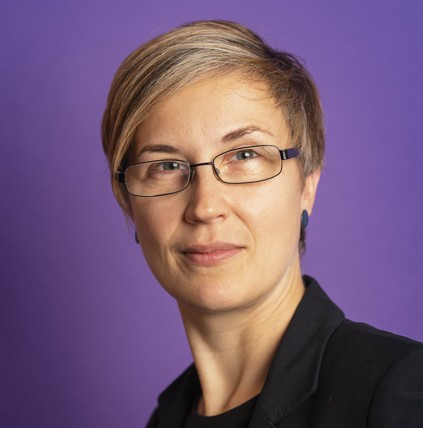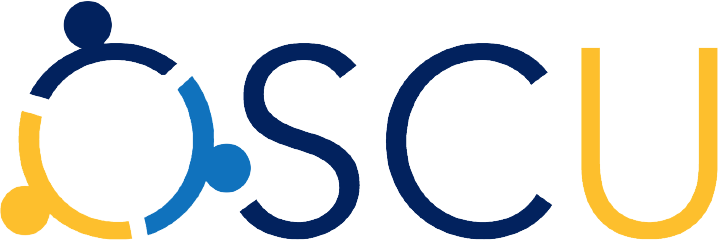News, Blog and Podcast
Introducing the OSCU Faculty Ambassadors: V. Anna-Lena Lamprecht, Faculty of Science

In the course of the next few months, we shall introduce the OSCU Faculty Ambassadors, so that OSCU members know whom to contact and what they can expect. Ambassadors are introduced through personal interviews. In this interview, we use the term Open Science in a manner which includes Open Scholarship.
Why did you decide to apply to become an Open Science Faculty Ambassador for the Open Science Community Utrecht? Open Science is on the rise, but I observed that people discussing and embracing its principles often form their own “bubbles” in the academic world. However, to really make the transition to the “new normal” (quoting Faculty of Science Dean Isabel Arends here) it is important to get everybody on board, from students to full professors, and also support staff. The OSCU Faculty Ambassadorship increases the visibility of Open Science in the faculty, and helps me to actively contribute to facilitating the transition.
Incidentally, the call for applications was circulated last year in the week of the National eScience Symposium. The theme of the main conference day was “Digital Challenges in Open Science”, featuring inspiring keynotes and interactive sessions on various Open Science topics. Motivated by the fresh impressions of the day, I sat down in the evening to write my application.
Why is Open Science relevant for your faculty? Which element do you think is most important? I would say that Open Science is relevant for the Faculty of Science for the same reasons it is relevant for other faculties. I really don’t think that the principal reasons vary a lot, although there are of course some differences between fields and disciplines. The Faculty of Science is however the largest faculty at Utrecht University, and it should therefore go ahead and set a good example. Fortunately, our dean is extremely supportive of the transition to Open Science, and actively pushes initiatives to make it happen.
About the most important element: As a software researcher, I am tempted to say that FAIR and open research software is of course most important, but that is not really true. I don’t think there is one single element that is most important. All are, and they need to go hand in hand. Facilitating that is probably the most important thing. For example, open access publishing is important, and maybe one of the best-known elements of Open Science. However, frequently the most important journals in a field don’t publish open access, or only for high fees that not every researcher can afford. Especially for young researchers this can be a dilemma, as they depend on publications in their discipline’s most prestigious outlets for success with their next grant application, job search, or promotion procedure. Thus, also the current practices of evaluating researchers have to change, away from spurious surrogate quality indicators like impact factors, and towards actual assessment of quality based on content. Through dependencies like this the transition to Open Science is a really complex endeavour. This is why we need active communities like OSCU, and also people who can influence and change policies. I am very happy to see what currently happens here in Utrecht with the university-wide Open Science program, OSCU, the faculties Open Science teams, Open Science in the new strategic plans, etc.
…the current practices of evaluating researchers have to change, away from spurious surrogate quality indicators like impact factors, and towards actual assessment of quality based on content.
Scientists are usually specialized in one or two fields. How will you represent and engage with your colleagues from different fields within the same faculty? Open Science is a cross-cutting concern rather than a specialization of any scientific discipline. Hence, I don’t aim to represent the technical expertise of all the different fields, but to understand common needs and concerns about Open Science practices. I do think though that my own interdisciplinary background helps me to engage with members of the different disciplines. I studied computer science and bioinformatics, and have been working in collaborative projects with microbiologists and geoscientists for several years. In fact, both my research and teaching focus on research software.
Open Science is a cross-cutting concern rather than a specialization of any scientific discipline.
And as almost everybody nowadays uses software in their research, there is always at least one common denominator to engage in a conversation.
You organized a symposium on Open Science for your faculty. How was that? It was the first in the series and took place in early February. That was before the corona pandemic really arrived here, so it was still an in-person event (almost unbelievable now!). The program filled an afternoon and looked at Open Science from various angles. It featured an opening by the dean Isabel Arends, a keynote by oceanographer Erik van Sebille, several short presentations by members of the different departments, and information markets with representatives from RDM support and the library, and ample time for socializing with other participants. You can actually read a report about the symposium in this blog! I was very happy that the symposium attracted so many and such diverse participants, and that we had lively discussions throughout the afternoon.
What will you do as an Ambassador, besides organizing a symposium? Several of our plans for community events during the year were unfortunately crossed by the pandemic situation that we are experiencing since March. In April we started a series of weekly online “OSCoffees”, where ambassadors and several invited speakers ran thematic sessions on various Open Science topics. We paused over the summer, but plan to be back with the next editions soon. Furthermore, we currently work on an Open Science Primer for young researchers, write a thought-provoking position paper about Open Science, and discuss new ideas for corona-proof community events. Personally, I am intrigued by the idea of running a “Wikipedia Editathon”, and hope that I will soon find time to work that out further!
Besides those joint OSCU initiatives, I am regularly involved in discussions of the current state and needs for the transition to Open Science at my faculty, for example during the development of the new strategic plan earlier this year. Recently our dean has installed an Open Science Team to promote the ideas of Open Science within the faculty. I have joined the team as OSCU Ambassador and Fellow for FAIR data and code. Among other things the team plans to organize Open Science related events and activities for members of the faculty, which we will do together with OSCU to use synergies.
Which challenges do you expect to face during the road ahead? There are many, but at the end of the day most comes down to achieving a massive cultural change in the scientific community. We need to reach everybody, and inspire, motivate, incentivize, nudge, and support them to do Open Science.
Thank your for reading this blog entry. If you want to stay updated, do keep an eye on this website, the Open Science Community Utrecht newsletter and follow us on Twitter.

